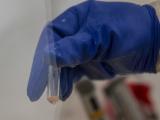Dec 3, 2007 (CIDRAP News) – Lobbying by the maker of the only US-licensed anthrax vaccine was a key factor in causing the federal government to cancel its big contract with VaxGen Inc. for a new anthrax vaccine that was expected to be safer, according to a report published yesterday by the Los Angeles Times.
The lengthy story details how Emergent BioSolutions Inc., Rockville, Md., mounted a campaign involving more than 50 lobbyists, including former aides to Vice President Dick Cheney, to cancel the government's $877 million contract with VaxGen Inc. of Brisbane, Calif., for a new vaccine for civilians.
The newspaper says Emergent BioSolutions "prevailed in a bitter struggle with a rival company that was preparing what federal health officials expected to be a superior vaccine. The episode illustrates the clout wielded by well-connected lobbyists over billions in spending for the Bush administration's anti-terrorism program."
The Department of Health and Human Services (HHS) awarded VaxGen the contract in 2004 to produce 75 million doses of the new vaccine, or enough to vaccinate 25 million people. But the company encountered problems with the vaccine's stability and potency, and HHS canceled the contract on Dec 19, 2006, after the problems caused VaxGen to miss a deadline for starting a clinical trial.
The contract was the first and largest award under Project BioShield, a federal program designed to stimulate the production of medical countermeasures for biological weapons and related threats. The cancellation came the same day President Bush signed legislation designed to revive the $5.6 billion program, which had drawn little interest from major pharmaceutical companies.
As the Times story recounts, the aim of the VaxGen contract was to provide a vaccine that would deliver protection with fewer side effects and fewer doses than Emergent's vaccine, called Anthrax Vaccine Adsorbed (AVA), or BioThrax. That vaccine, developed in the 1950s and used by the US military, requires six doses over 18 months and annual boosters thereafter. Hundreds of US military members over the years have refused the injections. A lawsuit by some military members forced the suspension of mandatory vaccinations for much of 2004 and 2005, but the program was later resumed.
The drive for a new anthrax vaccine began after the anthrax letter attacks in the fall of 2001 killed five people and sickened 17 others. Envelopes containing powdered anthrax spores were sent to two US senators' offices and several news media offices. Hundreds of postal workers and Capitol Hill staff members were treated with antibiotics in the wake of the attacks.
According to the Times, the federal decision to push for the acquisition of 75 million doses of a new, genetically engineered vaccine was made in late 2003. The thinking was that that amount would be enough to respond to simultaneous attacks on New York, Los Angeles, and Washington, DC, the story said.
President Bush signed the original Project BioShield legislation in July 2004, authorizing $5.6 billion for medical countermeasures. At the time, VaxGen had been working on its anthrax vaccine for 2 years, building on earlier work by the US Army and using $100 million in grants from the National Institute of Allergy and Infectious Diseases. The vaccine's active ingredient is a recombinant form of protective antigen, one of three components of the toxin produced by anthrax.
The Times reports that VaxGen was seeing problems with the vaccine's immunogenicity even before the company won the HHS contract in November 2004, but that complication didn't deter HHS from making the award. The contract called for VaxGen to start delivering doses in 2 years, with the company getting no payments until then.
When the contract was awarded, Emergent BioSolutions officials saw it as a threat to their company's existence and quickly launched a major lobbying campaign, according to the Times. In 2004 the company nearly tripled its spending on lobbyists, and from 2004 through June 2007 the firm paid 52 lobbyists a total of $5.29 million.
Among Emergent's lobbyists, the story said, were Jerome A. Hauer, a former HHS acting assistant secretary for emergency preparedness; John V. Hishta, a congressional staff member with strong ties to Republican congressional leaders; and Cesar V. Conda and Ron Christie, both of whom had been policy aides to Vice President Dick Cheney.
According to the newspaper, the company's lobbyists argued that:
- The lack of an anthrax vaccine stockpile meant civilians were at risk
- Emergent was ready to fill a civilian stockpile, whereas VaxGen hadn't proved it could deliver a new vaccine
- Emergent might stop making its vaccine if the government didn't buy a supply for civilians
The story said Emergent and its friends in congress "ridiculed VaxGen and impugned the competence or motives of officials who supported the new vaccine." The paper's investigation showed that the lobbying campaign "damaged VaxGen's credibility with members of Congress and the Bush administration."
In the spring of 2005, VaxGen determined that an aluminum additive that had been expected to increase the vaccine's potency actually had the opposite effect, company officials told the Times. The company needed time to figure out how to fix the problem, requiring patience from federal officials. But because of Emergent's lobbying effort, officials who had previously supported VaxGen's effort were no longer helpful, the story said.
At the time, Dr. Noreen A. Hynes headed the HHS office overseeing Project Bioshield drugs and vaccines. The BioShield law allowed advance payment of up to 10% of the value of a contract. Hynes told the Times that she sought permission to make an advance payment to VaxGen, but officials "at the highest level" denied the request.
HHS began buying anthrax vaccine from Emergent long before canceling VaxGen's contract, ordering a total of 10 million doses in May 2005 and May 2006. In September of this year, HHS awarded the company a $400 million contract for 18.75 million doses. The vaccine has a 3-year shelf life.
Kimberly B. Root, an Emergent spokeswoman, said the company's lobbying "ultimately served the national interest," the Times reported. Without it, the government might not have any anthrax vaccine for civilians, she said.
Bill Hall, an HHS spokesman, told the Times that HHS canceled VaxGen's contract because of the company's "poor performance." In making the decision, the agency "acted as effective custodians of government finances," he said.
But Dr. Phillip K. Russell, a vaccinologist who was a senior biodefense official in the Bush administration, said the contract cancellation was driven by politics, not national security, the Times reported.
Calling the outcome a "dramatic failure," Russell said that if HHS had given VaxGen a little more time, the company probably would have solved the problems with the vaccine.
"It wasn't an unsurmountable problem," Russell was quoted as saying. He had supported the VaxGen program while in government, but after leaving HHS in 2004, he didn't advise or lobby for either company, the story said.
See also:
Dec 19, 2006, CIDRAP News story "HHS cancels VaxGen anthrax vaccine contract"
Nov 4, 2004, CIDRAP News story "HHS to spend $877 on new anthrax vaccine"
Sep 26 CIDRAP News story "HHS orders 18 million doses of anthrax vaccine"
Oct 31 CIDRAP News story "GAO critiques anthrax vaccine procurement, management"




















